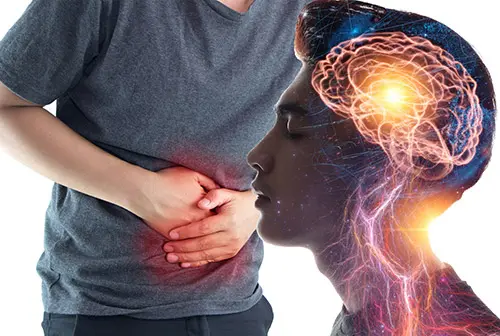What’s the difference between SIBO & IBS?
Published
Key takeaways on SIBO vs IBS
- SIBO (small intestinal bacterial overgrowth) is caused by excessive bacteria in the small intestine, while IBS (irritable bowel syndrome) is caused by the gut-brain axis.
- IBS and SIBO share common gut symptoms such as bloating, stomach pain, diarrhoea or constipation, which makes them difficult to distinguish.
- Studies suggest that many people diagnosed with IBS actually have SIBO and having IBS may actually increase the risk of developing SIBO.
- A SIBO breath test is the best way to confirm if symptoms are due to SIBO.
SIBO (small intestinal bacterial overgrowth) is a condition where too many bacteria grow in the small intestine. This disrupts digestion and absorption, leading to gas production, inflammation and nutrient deficiencies.
IBS (irritable bowel syndrome) is a so-called "disorder of gut-brain interaction". This means that it's caused by the gut-brain axis. The gut-brain axis describes the bidirectional communication between the brain and the gut enabled by nerves and IBS symptoms such as stomach pain, bloating and altered bowel habits occur because the gut doesn’t function properly. You can read more about IBS in our full article
IBS and SIBO both affect how the gut works and, because they share many symptoms, it can be hard to tell them apart without testing.
What’s the relationship between IBS and SIBO?
Although IBS and SIBO are different, there is absolutely a relationship between them. Studies have found that up to 85% of people who meet the diagnostic criteria for IBS also have a positive SIBO breath test1.
IBS itself may also increase the risk of developing SIBO. This is because one of the hallmarks of IBS is altered gut motility — the way the intestines move food along the digestive tract. When this movement is slowed or irregular, bacteria have more opportunity to build up in the small intestine, leading to SIBO.
This relationship explains why misdiagnosis is common. Many people live with an IBS label for years, when in fact their symptoms are due to SIBO, a condition that can be identified with testing and treated more directly.
Differences between SIBO & IBS
- Cause – SIBO has a clear physical cause - overgrowth of bacteria. In contrast, IBS does not have a clear physical cause and is related to the gut-brain axis.
- Impact - because SIBO can cause inflammation and malabsorption, we can see vitamin and nutritional deficiencies in SIBO that we don't find in IBS.
- Testing – SIBO can be detected with a breath test but there are no tests for IBS. Instead, we use specific symptom criteria to diagnose IBS as well as excluding other potential conditions (including SIBO).
- Treatment – both IBS and SIBO can be affected by diet and lifestyle changes. However, SIBO can also be treated with herbal antimicrobials or antibiotics which would not be used in SIBO whereas IBS may respond to probiotics and tricyclic antidepressant drugs.
- Course – SIBO may resolve with treatment (though it can recur), while IBS is typically chronic but fluctuating.
Similarities between SIBO & IBS
- Symptoms – both SIBO and IBS cause bloating, stomach pain and diarrhoea or constipation.
- Impact – SIBO and IBS both have a significant impact on quality of life with depression and anxiety being common in both conditions2.
- Dietary response – both conditions may improve with diets such as low FODMAP, which reduce fermentable carbohydrates.
- Individual variation – symptoms, triggers and severity vary greatly between individuals in both conditions.
How to tell if you have SIBO or IBS
It's almost impossible to tell the difference between SIBO and IBS based on symptoms alone. However, there might be some clues in your medical history that could suggest SIBO such as vitamin B12 deficiency, prolonged use of antiacid medications or thyroid problems. You could also perform "blind" treatment with herbal antimicrobials or antibiotics - if symptoms improve then this would make SIBO likely.
Ultimately, the best way to know for sure if you have SIBO is by taking a breath test. If a breath test is negative, then SIBO is less likely (though not impossible) and you should rule out some other common conditions such as coeliac disease, inflammation and H. pylori infection. Our Essential IBS Test checks for these.
Get your symptoms checked with our SIBO test
Get tips on better health
Sign up to our emails on the better way to better health.
We'll keep you up-to-date with the latest research, expert articles and new ways to get more years of better health.






